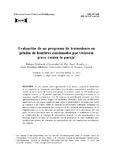Mostrar el registro sencillo del ítem
Evaluación de un programa de tratamiento en prisión de hombres condenados por violencia grave contra la pareja
| dc.creator | Echeburúa, Enrique | es_ES |
| dc.creator | Fernández-Montalvo, Javier | es_ES |
| dc.date.accessioned | 2014-06-11T09:17:54Z | |
| dc.date.available | 2014-06-11T09:17:54Z | |
| dc.date.issued | 2009 | |
| dc.identifier.issn | 1697-2600 (print) | |
| dc.identifier.issn | 2174-0852 (electronic) | |
| dc.identifier.other | 710 | |
| dc.identifier.uri | https://hdl.handle.net/2454/10804 | |
| dc.description.abstract | En este estudio cuasi-experimental se ha puesto a prueba la efectividad de un programa de tratamiento psicológico para hombres encarcelados por haber cometido un delito grave de violencia de pareja. La muestra constó de 148 hombres que cumplían condena en 18 cárceles españolas. El tratamiento psicológico consistió en un programa cognitivo-conductual, con 20 sesiones de periodicidad semanal, que duró aproximadamente 8 meses. Según los resultados obtenidos, hubo una modificación significativa de los sesgos cognitivos tanto sobre la inferioridad de la mujer como sobre la violencia como forma válida de afrontar las dificultades cotidianas. Asimismo los sujetos tratados experimentaron una reducción de los síntomas psicopatológicos, de la impulsividad y de la ira, así como un aumento significativo en la autoestima. Por otra parte, la única diferencia entre los sujetos que abandonaron el tratamiento y los que lo completaron fue la ausencia de antecedentes penales. La alta impulsividad y los síntomas depresivos antes del tratamiento fueron predictores de unos resultados terapéuticos más pobres. Se comentan las implicaciones de este estudio para investigaciones futuras. | es_ES |
| dc.description.abstract | In this cuasi-experimental study the effectiveness of a psychological treatment program for men who were in prison because of having committed a serious offence of gender violence is tested. The sample consisted of 148 men who were imprisoned in 18 Spanish prisons. The psychological treatment was a cognitive-behavioral program, in a group format, with 20 weekly sessions that lasted for 8 months. The results showed a significant modification of the irrational beliefs both about women and about violence as a strategy to cope with everyday difficulties. Likewise a significant decrease of the psychopathological symptomatology, of anger and impulsivity, as well as a relevant increase in the self-esteem, was obtained. On the other hand, results indicated that the only difference between the patients who dropped out of treatment and the ones who completed it was the lack of previous criminal record. High impulsivity and depressive symptoms before treatment predicted a poorer therapeutic outcome. Implications of this study for future research in this field are commented upon. | en |
| dc.format.mimetype | application/pdf | en |
| dc.language.iso | spa | en |
| dc.publisher | Asociacion Española de Psicología Conductual | es_ES |
| dc.relation.ispartof | International Journal of Clinical and Health Psychology, 2009, 9(1). Págs. 5-20 | en |
| dc.rights | © International Journal of Clinical and Health Psychology. Creative Commons Attribution-NonCommercial-NoDerivatives 4.0 International (CC BY-NC-ND 4.0) | en |
| dc.rights.uri | https://creativecommons.org/licenses/by-nc-nd/4.0/ | |
| dc.subject | Violencia de género | es_ES |
| dc.subject | Prisiones | es_ES |
| dc.subject | Tratamiento psicológico | es_ES |
| dc.subject | Cuasi experimento | es_ES |
| dc.subject | Gender violence | en |
| dc.subject | Prison | en |
| dc.subject | Psychological treatment | en |
| dc.subject | Quasi experiment | en |
| dc.subject | Male spouse abusers | en |
| dc.subject | Batterers | en |
| dc.subject | Disorders | en |
| dc.subject | Prisons | en |
| dc.subject | Profile | en |
| dc.subject | Guide | en |
| dc.subject | Model | en |
| dc.title | Evaluación de un programa de tratamiento en prisión de hombres condenados por violencia grave contra la pareja | es_ES |
| dc.title.alternative | Assessment of a psychological treatment program with inmate men convicted of serious gender violence | en |
| dc.type | Artículo / Artikulua | es |
| dc.type | info:eu-repo/semantics/article | en |
| dc.contributor.department | Psicología y Pedagogía | es_ES |
| dc.contributor.department | Psikologia eta Pedagogia | eu |
| dc.rights.accessRights | Acceso abierto / Sarbide irekia | es |
| dc.rights.accessRights | info:eu-repo/semantics/openAccess | en |
| dc.relation.publisherversion | http://www.aepc.es/ijchp/articulos.php?coid=Espa%F1ol&id=306 | |
| dc.type.version | Versión aceptada / Onetsi den bertsioa | es |
| dc.type.version | info:eu-repo/semantics/acceptedVersion | en |



